Imagine it's early 1939...
...German troops occupy Bohemia and Moravia. Czechoslovakia ceases to exist.
...Spanish national troops take Barcelona with Italy's help.
...Adolf Hitler orders the German military to plan for the invasion of Poland.
...French Foreign Minister Georges Bonnet proposes a "peace front" of France, the Soviet Union, Great Britain, Poland, and Romania to deter Germany.
...The fourth and final bear market of the 1930s begins after an August buying panic that takes the Dow to a peak of 155.
If you're like most people, you can't shake the nagging feeling that something sinister is just around the corner.
After a decade of feckless political leadership, bailouts, and corporations that are getting bigger at your expense, your wallet is definitely pinched. Wages are flat to middling.
Your next move... uncertain.
Your temptation... to run for the hills.
Yet, in one of the greatest investing moves of all time, a single quiet and unassuming man named John Templeton borrows $10,000 and buys 100 shares of every stock trading on the New York Stock Exchange for under $1. All but four would turn out to be profitable investments.
Years later, he would go on to become an investing legend by refining and following the same strategy - "buying when others are despondently selling."
Every $10,000 invested with Templeton when he set up his fund turned into at least $2 million by the time he retired. Eventually, he became so wealthy he gave away more than $1 billion to charity.
Fast forward to 2015...
Change the names and places, and it's Russian strongman Vladimir Putin who threatens global stability. Farther south, ISIS is expanding its influence in a grotesque orgy of barbarity.
Just as they did in 1939, the stock markets are pushing new highs thanks to meddling from the U.S. Federal Reserve.
All the while, our politicians act as if they've got the situation under control, which is almost a guarantee that they don't. Once again, it's tempting to head for the hills.
But sitting on the sidelines is exactly what you don't want to do as an investor.
How do I know?
Because chaos almost inevitably produces the biggest profits.
Sir John Templeton waded into the markets on the eve of global chaos in 1939 because he knew that investors' emotions almost always get the better of them. He understood that they were driven to make exactly the wrong decisions over and over again - buying when they should be selling and selling when they should be buying.
You and I have talked about that many times over the years because investors are still prone to that counterproductive way of thinking. Investors who make emotional decisions doom themselves to poor returns, often trailing the returns of the markets by hundreds of percentage points over time, according to research from DALBAR Inc. and others.
Those who make logical decisions day after day become the real champions in the investing world.
There's something else we talk about a lot, too. And it's equally important, especially right now.
Templeton was so successful because he didn't just fling his money around. Like us, he preferred unglamorous stocks.
Sir John tapped into "must-have" investments - investments dealing in sectors humanity can't survive without - every chance he got, just like we do in all my investing services, from Total Wealth to the Money Map Report to High Velocity Profits.
Like you and me, Templeton hated gambling. He saw no need to take unnecessary risks.
But he understood clearly that calculated risks were part of the game, especially when it came to finding value others didn't see or recognize.
Were he alive today, I have no doubt that Sir John Templeton would be making the case just as I am that...
...NOW is precisely the moment to invest in Russia.
I won't hold it against you if you recoil at the idea.
In fact, I'm counting on it, because that's what makes our timing so perfect... 99% of all investors are missing out and would never invest in Russia right now. So there's a true "first mover" advantage.
Instead, they'll sit back and wait for things to "get back to normal" before making their move.
As usual, they'll miss the truly extraordinary profits.
In fact, Russian market ETFs have risen 24% from their December 2014 lows, and they're among the world's best performers year to date. But there's a lot more ahead, as I'll show you.
The question you need to be asking yourself right now is not whether to invest in Russia, but rather, how you will feel in the future knowing that you've been left behind (again) if you don't.
Five Reasons to Invest in Russia Today
1) Just about everybody who is going to sell has already sold.
Standard & Poor's downgraded Russian debt to only one notch above junk last January. Investors pulled more than $151.5 billion out of Russia in 2014, according to Reuters. Analysts are comparing what's happening in Russia to the Great Depression. Even Russia's own finance minister, Anton Siluanov, has said that the economy could contract another 4% in 2015.
The sell-off has been so extreme that the Russian markets are trading at around a PE of five times earnings. The S&P 500, by comparison, is trading at a PE of around 18.95.
Investing in Russia now means that you are significantly likely to outperform more expensive global markets for the next decade - possibly more because the worst is already priced in.
Any shift from "terrible" to "merely bad" could result in a 30% run in Russian stocks in general.
2) Your neighbors will think you've lost your mind.
Sir John Templeton's secret was understanding emotion. He understood that the best returns came from doing things others would consider ludicrous. Some call this contrarian investing, but really it's finding value where others don't see it.
The fact that most global traders and the mainstream media are almost universally against Russia right now is a glaring signal that emotions are running high. Given that we know they are almost always wrong, the logical move is to take the other side of the trade.
3) Negative headlines about Russia are on the covers of several major magazines, including The Economist.
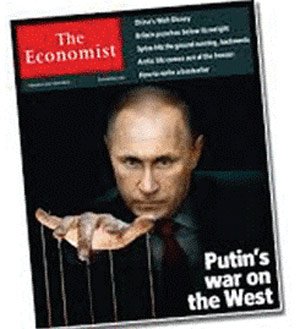 That's a dead giveaway that it's time to make your move, as far as I am concerned.
That's a dead giveaway that it's time to make your move, as far as I am concerned.
That's because the mainstream media almost always latches on to what it knows will sell. After all, their job is to sell popular narratives, so they want to tap into the emotions we've just talked about. Never mind that in doing so, they lead millions down exactly the wrong financial path.
I've written a lot about this over the years because the "magazine cover" indicator is extremely powerful.
4) Oil is firming up.
While short-sighted analysts will look at the collapse of oil prices relative to last summer and bemoan the loss, forward thinkers will look to price projections for the future. And as WTI crude oil prices seem to have stabilized in the $46-$50/barrel range as of early March, numerous forecasts - ranging from the U.S. Energy Information Administration (EIA) to private research firms like Deloitte and McKinsey - expect that the growth in demand for oil will far exceed supply in the years to come. That puts a floor on the price.
This long-term picture of steady recovery in oil prices is also an enormously bullish development for investments in Russia.
Not many people realize this, but fully 50% of Russia's federal budget revenue comes from oil. That's understandable when you consider that it accounts for nearly 70% of Russia's exports and approximately 25% of its gross domestic product.
So any upside, any price stability at all is a boost. And Putin knows it. But the vast majority of Russia-leery investors don't.
5) Putin needs the West even as he hates the West.
I know that's hard to believe given the hardball Putin is playing and what's going on the Ukraine right now. But take a step back for a minute.
Russia may have political problems with the West based on a centuries-old xenophobic posture, but the country is upgrading its infrastructure, building technology, maintaining open currency markets, and even engaging Western companies doing business there.
The process is not yet smooth by any stretch of the imagination. Corruption is still a national sport, and there's still a long way to go for Russia's political evolution. But no one can dispute the fact that Putin wants Moscow to be a global financial center, just as the Chinese want Shanghai to become one.
And that means he will continue to change his tune along with his wallet over time.
Now if this resonates with you as an extraordinary profit opportunity - the way it does with me - here's how I suggest you play it right now.
[mmpazkzone name="in-story" network="9794" site="307044" id="137008" type="4"]
Must-Have Russian Stock No. 1: Qiwi Plc. (Nasdaq: QIWI)
As sanctions make it increasingly difficult for Russian companies to seek capital abroad, domestic financing is becoming even more crucial.
That's where Qiwi Plc. (Nasdaq: QIWI) comes in.
Headquartered in Chertanovo, Moscow, QIWI provides Russia, Kazakhstan, Moldova, Belarus, the United Arab Emirates, and the United States with many of the financial services that the Western world takes for granted, like bill payments and simple financial transactions. It's developed a loyal following in a notoriously complicated part of the world, where consumers are way behind their Western counterparts and, more importantly, acutely aware of what they are missing out on.
The stock has seen a 33% drop since early November, which to me represents a great buying opportunity. This plunge had been driven by downward revisions, with traders overreacting to a single data point - the only revision to QIWI's anticipated earnings in the entire month of December - to drive the stock down.
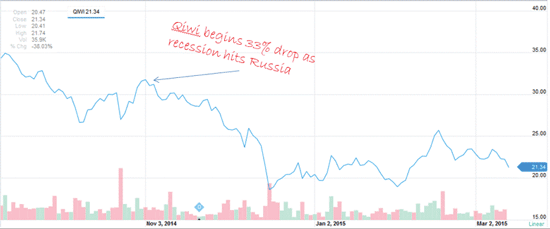
Certainly there's nothing in the earnings QIWI has reported for last quarter to validate this stock slide. On March 12, 2015, the company announced total adjusted net revenue of $43.9 million for Q4 2014 - a 45% surge in revenue year over year - and net revenue of $157.1 million for the fiscal year of 2014, an increase of 43% over 2013's total. These healthy increases are a testament to a resilient company that is not just surviving but thriving amid the headwinds of Russia's recession.
Even more jarring, the stock slide has come at a time when QIWI, far from contracting, is expanding its empire. In late October, eBay announced a plan to integrate QIWI's next-generation payment system, Visa QIWI Wallet, as a payment option on eBay in Russia. The move means that Visa QIWI Wallet can now be used to pay for more than 250 million products that are offered by cross-border vendors from eBay to consumers in Russia.
In November, QIWI acquired Money.Mail.ru, a payment service belonging to one of Russia's biggest internet companies. In February 2014, it announced a strategic partnership with MegaFon, a leading Russian telecommunications operator, to pool both companies' resources and expertise to develop high-tech solutions for electronic payments. The move opens MegaFon's subscribers to Visa QIWI Wallet, where they will have the chance to make commission-free payments for a wide range of products and services supported there.
With partnerships of these magnitudes, it's not surprising that the number of active Visa QIWI Wallet accounts grew by 10% year-over-year in Q3/2014, with CEO Sergey Solonin reporting 16.5 million active accounts in total. Even better were the Q4/2014 numbers reported this spring, where Visa QIWI Wallet accounts grew by 12% in 2014, to 17.2 million active users.
What's extremely encouraging about QIWI's growth is that the financial payment service provider is achieving this level of growth despite Russia's capital flight more than doubling in 2014, to $151 billion. When the news in Russia goes from terrible to less bad - and foreign capital starts to return even as domestic spending increases - QIWI will be able to ride a surge in demand, and yield incredible profits for investors who buy the stock at its discounted price today.
Must-Have Russian Stock No. 2: Open Joint Stock Company Gazprom (OTCMKTS: OGZPY)
To more than 99% of investors, Gazprom (OTCMKTS: OGZPY) would seem to have two instant deal breakers.
Not only is it a Russian company - enough in itself to cause investors to flee it by default - but it's also a major player in the oil and gas industry - perhaps the most hated sector in the world right now.
The stock has fallen by 45% since June 2014, and investors have written off this Russian oil and energy giant, barring a miracle. What they don't realize is that Gazprom has a history of rolling out pleasant surprises.
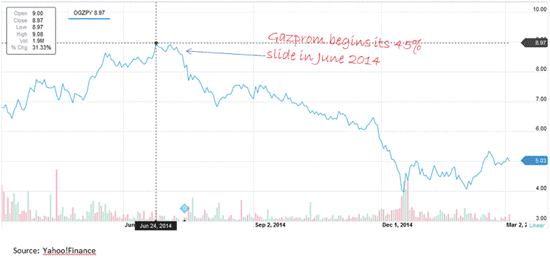
In May 2011, for example, Gazprom astounded observers by pulling off a 30% increase in exports compared to May 2010, despite the fact that it was an extremely volatile time for energy companies. It increased its exports thanks to mounting recognition that the state-owned Russian company was a more reliable supplier of fuel than the turbulent Middle East - an assessment that holds true today.
Last summer the world's biggest conventional gas producer surprised again, ushering in the world's most powerful gas trader, Elena Burmistrova, to head its export division. Burmistrova was widely credited with bringing about Russia's $400 billion deal with China in June 2014, and her appointment is a heartening sign that Gazprom is taking the importance of expanding eastward very seriously.
This is very important for Gazprom's long-term outlook because China's demand for natural gas is set to triple over the next 25 years, according to a report from the EIA. The fact that Gazprom has elevated a major broker and veteran of national export agreements is an extremely bullish sign that Gazprom is positioning itself to win the future of natural gas exporting.
On Feb. 13, 2015, Gazprom surprised again. At a time when analysts were sure that slashed energy prices would halt expansion efforts, Gazprom announced talks with China to pursue an intergovernmental agreement to bring even more Russian pipeline gas to China via the western route. The deal, which according to Gazprom's Chairman of Management Alexey Miller would open up China to an additional 30 billion cubic meters of Gazprom's natural gas, is "moving ahead at a good pace."
Gazprom has another advantage that's almost never recognized in the media. Because it works essentially as an arm of the Russian government, it's a business that the Kremlin will not allow to fail or even come to any significant harm. Analysts have correctly observed that as Putin clings to power despite the recession, a perverse effect will be that the crisis strengthens his crony capitalists while undermining companies that had been thriving based on free market principles.
With Gazprom seen as a potential weapon for Putin to wield against Eastern Europe by depriving it of natural gas imports they depend on so heavily, the Kremlin's strongman won't allow it to fail. Combine that with the cash reserves of more than $24.62 billion that the company can depend on to ride out the crisis, and it's clear to less short-sighted observers that Gazprom isn't going anywhere.
And when oil prices recover in the latter half of 2015 as both OPEC and the EIA predict, Gazprom will be set to recover beautifully.
Must-Have Russian Stock No. 3: Mail.ru Group (OTCMKTS: MLRYY)
For one of Russia's largest Internet companies, the argument is pretty compelling... assuming you can get over the fact that it's a Russian company - and I hope you can.
That's because Russia is one of those places that's perpetually in the news for all the wrong reasons. Yet, like China, it's loaded with potential. More importantly, so are its consumers.
Mail.ru Group (OTCMKTS: MLRYY) is a company that captures 96% of all Russian Internet users every month and a whopping 74% every day, according to JPMorgan. It's been knocked down by more than 59% by Russia-leery traders since June 2014 - despite the aggressive moves it's made to expand its empire when by all rights the company should be in hiding.
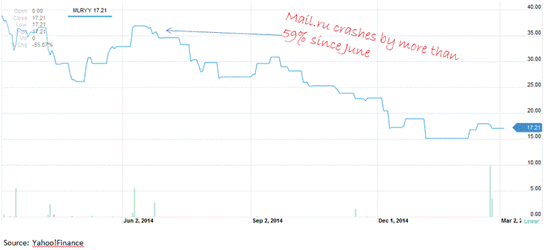
Mail.ru operates Russia's version of Twitter. And while my regular readers know I don't think much of social media and in particular the real Twitter as an investment opportunity, for Mail.ru I make an exception. The vast majority of Russians - even, to a large extent, the wealthier ones - use social media in a different way than Westerners do. Infrastructure is terrible in the country, and the crisis in roads, bridges, phone lines, and even snail mail has nurtured an environment where Russians use social media less as a luxury and more as an important mode of communication.
It is majority-owned by Russia's richest man, Alisher Usmanov. Mail.ru also owns 100% of VK, known as Russia's version of Facebook, after buying the remaining 48% stake in September.
The $148 million that Mail.ru paid to solidify its control over VK might seem hefty considering that VK turned a net profit of just $1.5 million in 2013. But the strategic rationale behind the purchase is incredibly sound: Mail.ru is snatching up Russia's most popular social networking site in an effort to corner the online market. It also owns Russia's second-most popular networking site, Odnoklassniki (classmates), in addition to the professional recruiter agency HeadHunter.ru, and even the dating site mamba.ru.
Out of respect for the brands of the sites it's absorbing, Mail.ru has pledged to leave its formats intact - except to bring in more ads! And the flurry of acquisitions is already resulting in a bump in the company's revenue. Mail.ru reported FY 2014 group aggregate revenue and aggregate net profits of RUB 35.78 billion and RUB 12.52 billion, which represents increases of 14.8% and 11.4%, respectively, over the same period a year ago.
I believe that Mail.ru will continue to thrive as it brings in more acquisitions to its empire while simultaneously monetizing the tens of millions of new users it has.
I'd be remiss not to point out that the stock's average three-month volume as of early March has been thin, even as Mail.ru continued to roll out impressive buyouts. This signals to me that investors aren't finished shunning the stock and arbitrarily driving it down further. This phenomenon has nothing to do with the stock's fundamentals and everything to do with emotion and psychology - which is why I'm recommending a strategy for you to take advantage of it.
Must-Have Russian Stock No. 4: Yandex NV (Nasdaq: YNDX)
Maybe you've heard of the recent trend in Russian Instagram postings, where Russia's elite post pictures of caviar and other luxuries to defiantly ask the West "#whatrecession?"
And based on the numbers his company is seeing, CEO Arkady Voluzh could legitimately ask the same question.
Yandex NV (Nasdaq: YNDX) is the Russian equivalent of Google, and it's having an excellent 2015 so far. Its Q4 2014 and full-year 2014 earnings report released on Feb. 18, 2015, show a company that is thriving as it grows its user base and becomes even more ubiquitous in Russia.
Its Q4 2014 quarterly revenue of $260.7 million were up 23% from Q4 2013, while its net income of $134.6 million was up a stunning 126% year over year, a terrific sign that revenue is climbing while costs are being efficiently minimized.
Yandex 2014 Earnings Report - Double and Triple-Digit Growth amid Recession
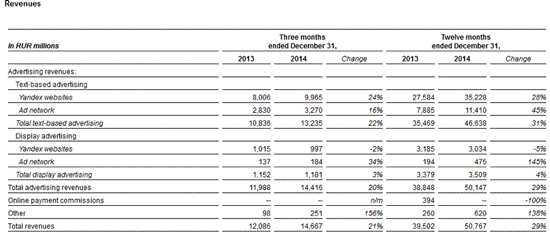
The surge in earnings is both deep and broad-based, with text-based advertising revenue leading the way with 22% growth compared to Q4 2013, while paid clicks on Yandex and its partners' websites were up 18%.
Despite the unambiguously good, even triumphant earnings report, investors have largely ignored the news. YNDX's shares closed up a paltry 0.24% on the day of the news, a testament to the company's relative anonymity overseas and the stigma it faces for being Russian.
The strength that YNDX is showing amid the full-blown currency crisis that Voluzh modestly referred to as "challenging economic headwinds" is proof positive that the company is a stock that shouldn't be underestimated. Yet the stock is down 55% from its June 2014 high, which makes it very attractive.
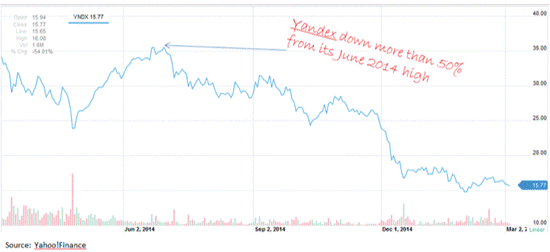
YNDX is also quite cheap thanks to the downturn, with a trailing PE ratio of 9.51, barely one-third Google's PE ratio of 27.22.
In fact, with a forward PE of merely 0.32, it's probably one of the most attractive stocks I can think of, based on its fundamentals.
More promising than ever and with an extremely steep discount, YNDX is a stock to buy to benefit from Russia's recovery.
Tactics to Maximize Your Profits
Now I want to talk tactics for a minute.
Russia is obviously a fluid situation. There will be more volatility ahead driven by an unpalatable mix of military and economic news.
That's why you've got to stick (as I did here) to high-quality, must-have companies with strong finances, strong management, and even stronger competitive potential.
It's also why you've got to limit your risk.
The three best ways to do that are, fortunately, very simple.
First, do NOT invest more than 2% of your investable capital in any of these positions.
Investing in Russia is a speculative play you want to reserve for risk capital, assuming you've got your core portfolio properly balanced and aligned using something like the 50-40-10 I advocate in the Money Map Report. If you haven't got that covered, you have no business buying Russian companies. Period.
Second, consider averaging in.
I've talked a lot about that over the years with subscribers because doing so is a proven path to higher returns. By breaking your capital into chunks and buying in gradually, you are less susceptible to market swings that are so tough for investors to handle.
For example, let's assume you wish to buy shares of stock XYZ. You have a total of $300 in capital you're willing to invest. By averaging in, you might commit to buying $100 worth of shares every month for three months. In the first month, the stock might be trading at $10 per share - so you snatch up 10 shares. Next month, it's dipped to $5 a share, and you pick up 20 shares. In the third month it reverts to its original price, and you buy 10 shares again. Congratulations - you now own 40 shares at an average cost of $7.50 per share, 25% less than what you would have paid had you bought all of the shares at once during two of those three months.
Third, run protective stops.
It makes no sense whatsoever to invest in Russia without a protective stop, especially when you know that there's lots of volatility ahead. My suggestion is that you handle this using a 25% trailing stop below your purchase price, but you might also consider using a 12-month calendar stop that forces you to make an "I'm still in" or "I'm out" decision.
In closing, I'll obviously be watching these companies very closely - and looking for still more opportunities - in the months ahead. And, as you might suspect, I'll be providing updates along the way, too.
Stay tuned!
Russia will be a very different place in five years than it is today.
Editor's Note: "Must-have" companies backed by Unstoppable Trends are a cornerstone of Keith's wealth-building strategy. But there's another type of investment he wants Money Morning Members to know about. It's one of his favorites, a kind of "desert island fund" he'd buy if he had to park his money in one place, "retire" from civilization for 20 years, and come back to a pile of money. Click here to learn more...
The post The Most Controversial Recommendation I'll Make All Year appeared first on Money Map Report.
Follow Money Morning on Twitter @moneymorning, Facebook, and LinkedIn.
[mmpazkzone name="end-story-hostage" network="9794" site="307044" id="138536" type="4"]
About the Author
Keith is a seasoned market analyst and professional trader with more than 37 years of global experience. He is one of very few experts to correctly see both the dot.bomb crisis and the ongoing financial crisis coming ahead of time - and one of even fewer to help millions of investors around the world successfully navigate them both. Forbes hailed him as a "Market Visionary." He is a regular on FOX Business News and Yahoo! Finance, and his observations have been featured in Bloomberg, The Wall Street Journal, WIRED, and MarketWatch. Keith previously led The Money Map Report, Money Map's flagship newsletter, as Chief Investment Strategist, from 20007 to 2020. Keith holds a BS in management and finance from Skidmore College and an MS in international finance (with a focus on Japanese business science) from Chaminade University. He regularly travels the world in search of investment opportunities others don't yet see or understand.



